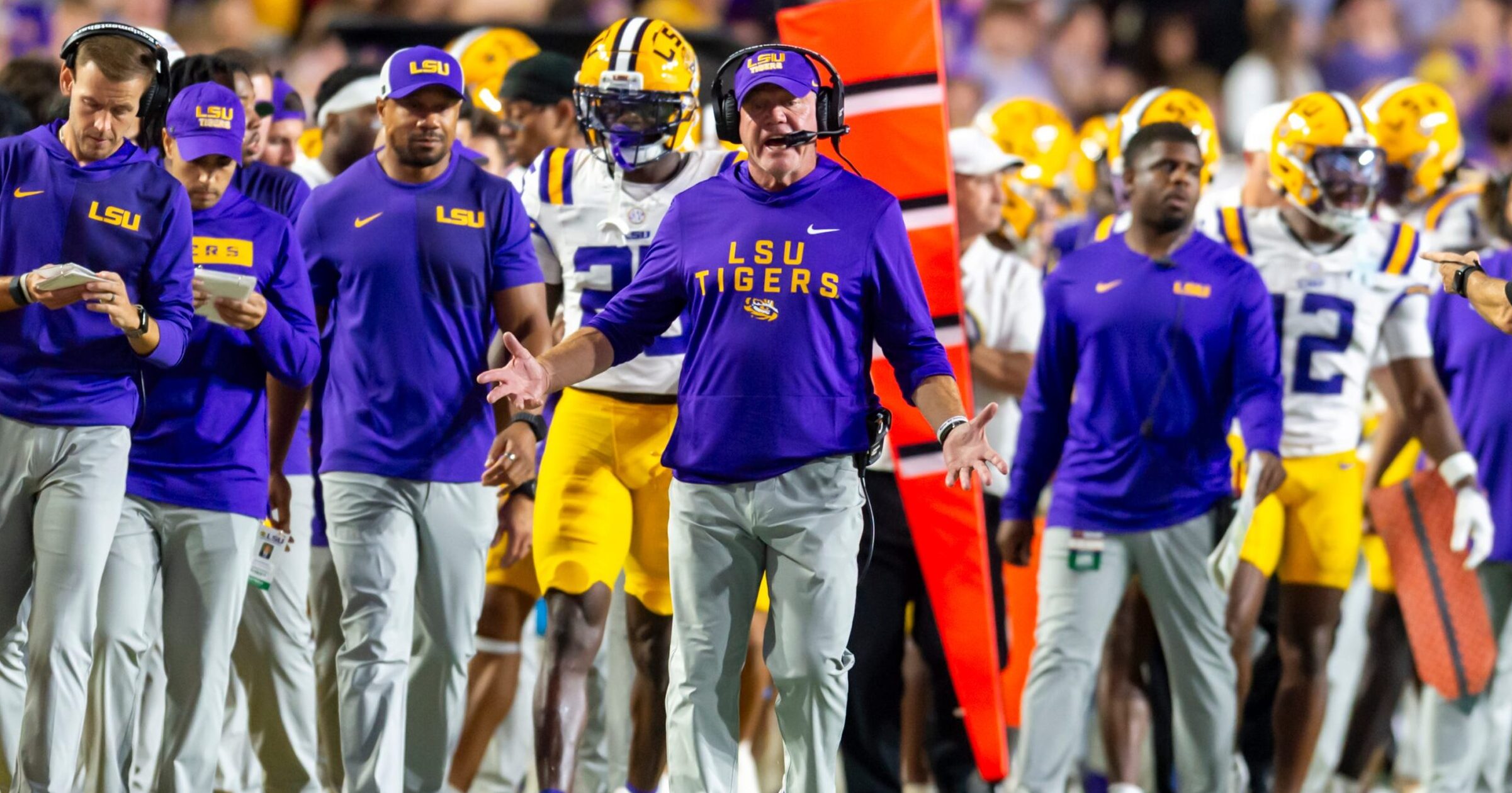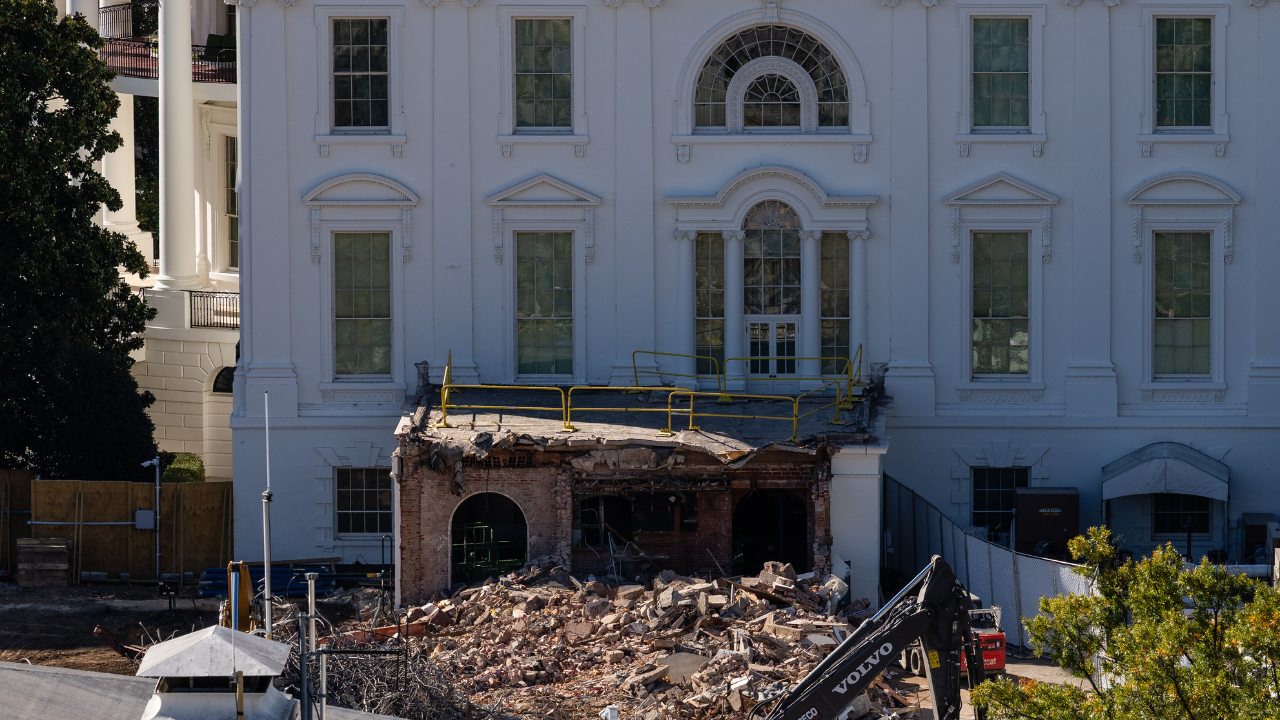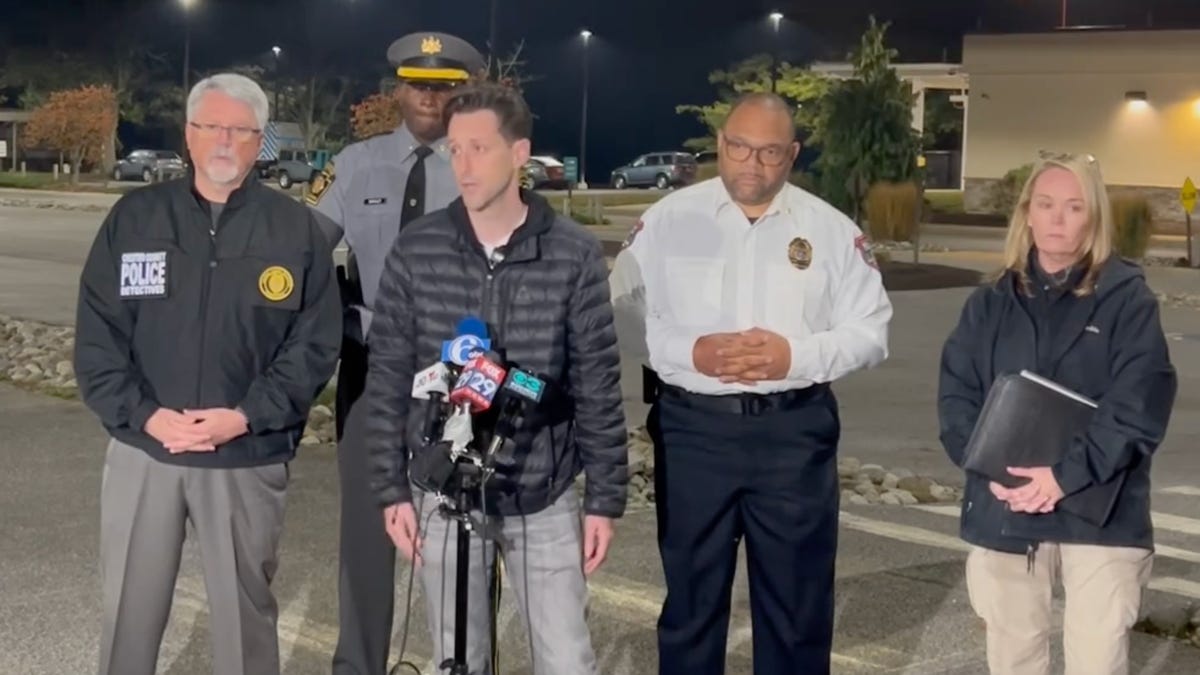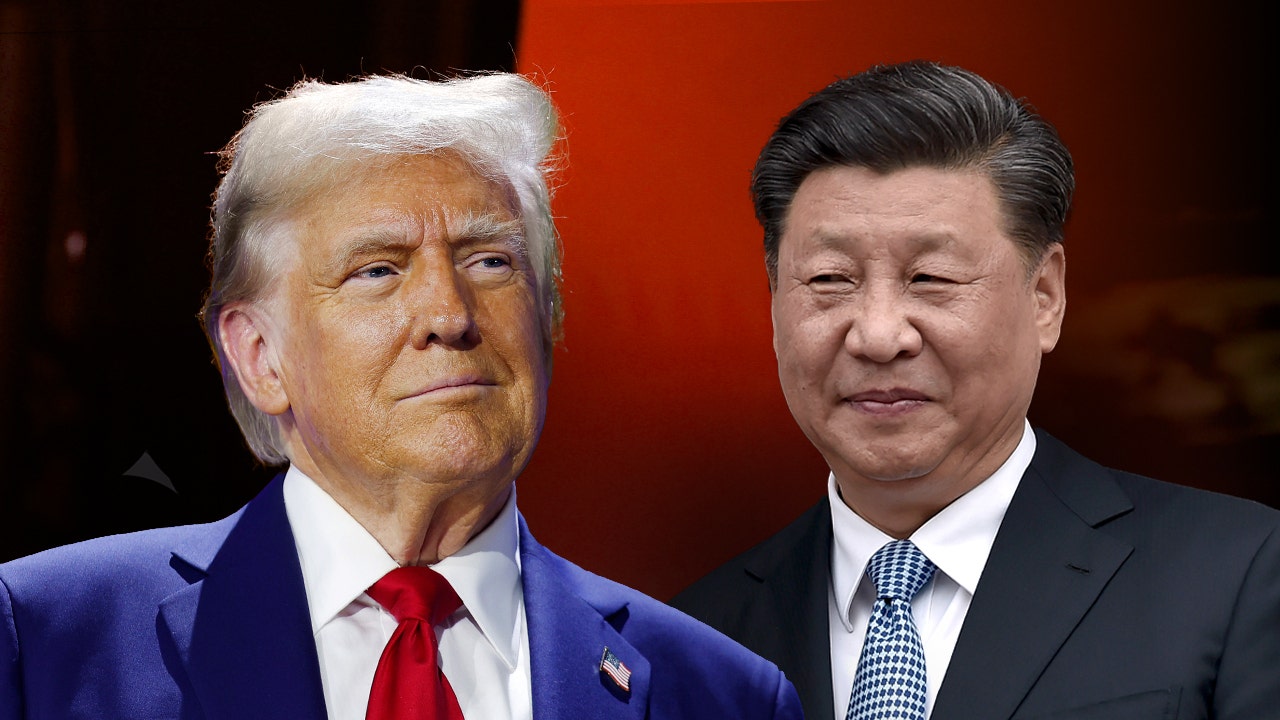California
McDonald’s, Chipotle to raise menu prices in California next year as fast-food wages rise to $20
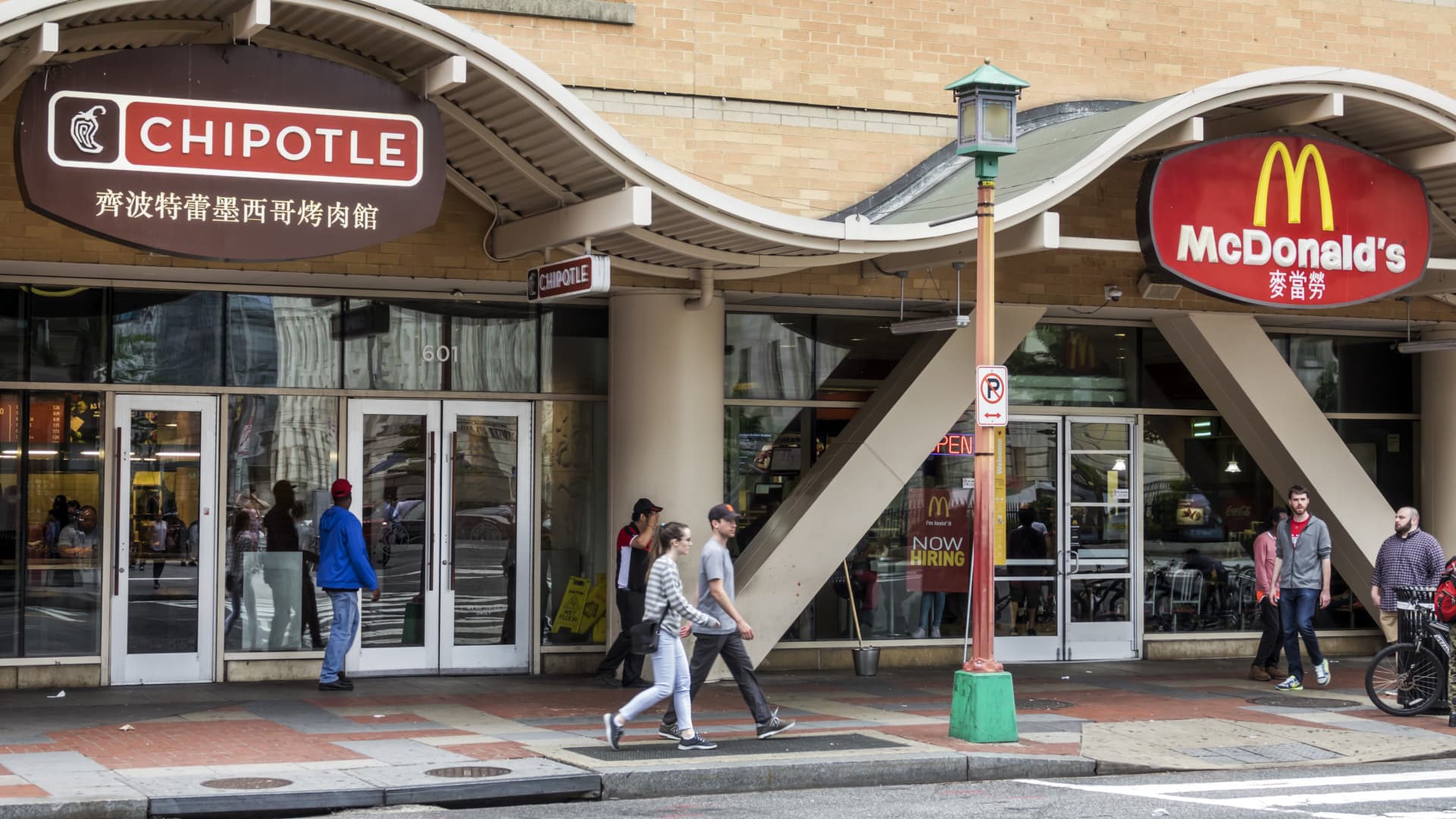
Chipotle and McDonald’s fast-food restaurants in Chinatown in Washington, D.C.
Jeff Greenberg | Universal Images Group | Getty Images
McDonald’s and Chipotle Mexican Grill will raise their menu prices in California next year to offset the state’s minimum wage increase for fast-food workers, executives said as both chains announced quarterly earnings in recent days.
McDonald’s has not decided how much it will hike prices in California as workers’ wages rise to $20 an hour, CEO Chris Kempczinski said Monday. Chipotle expects it will raise prices by a “mid-to-high single-digit” percentage in the state, but has not made a “final decision,” its Chief Financial Officer Jack Hartung told analysts on the company’s conference call Thursday.
Restaurants have been hiking menu prices for more than two years in response to rising ingredient and labor costs. Prices for food away from home were up 6% in September compared to a year ago, according to the U.S. Bureau of Labor Statistics.
While diners are already used to paying more for their meals, some have been eating out less often to mind their budgets. McDonald’s executives said Monday that consumers making under $45,000 have been visiting less frequently, contributing to a dip in its U.S. traffic this quarter.
In September, the restaurant industry and labor groups ended an expensive, monthslong battle over a bill that would have created a 10-person council that governs fast-food chains in California by setting guidelines for working conditions and wages.
Instead, the two sides settled on a compromise: a nine-person council that only has the power to set the pay floor for the fast-food industry in the state through 2029. Chains with at least 60 locations nationwide will have to pay their workers at least $20 an hour, starting April 1. Between 2025 and 2029, the appointed council will have the authority to raise the hourly minimum wage annually by whichever is lower: 3.5% or the annual change in the consumer price index.
For Chipotle, the new pay floor means it will hike its wages roughly 18%. Hartung said the chain’s average wage in the state is currently $17 an hour.
As wages rise, Chipotle customers will pay much more for their burritos and bowls in California, which is home to roughly 15% of Chipotle’s restaurants — and the company’s headquarters.
The chain has already raised prices four times since June 2021. The most recent price increase of 3% happened earlier in October.
At McDonald’s, price increases will only be one method to offset the higher labor costs. The chain will likely also look at ways to improve productivity to cut restaurant-level costs, Kempczinski said Monday.
Unlike Chipotle, which owns the overwhelming majority of its locations, most of McDonald’s California locations are run by franchisees. They have the freedom to decide prices, although the chain provides advice on the best strategy. Just under 10% of McDonald’s U.S. restaurants are located in California.
The burger chain anticipates that operators there will feel the pain of the wage hike in the short term.
“There will certainly be a hit in the short term to franchisee cash flow in California,” Kempczinski said on the company’s conference call, adding that it’s unclear at this point how big the blow will be.
The National Owners Association, an independent advocacy group of more than 1,000 McDonald’s U.S. franchisees, projected the bill will cost each restaurant in the state $250,000 annually, according to a September memo viewed by CNBC. McDonald’s, which dealt with franchisee backlash for its role in the compromise’s negotiations, declined to comment at the time on the NOA’s estimates.
In the long term, McDonald’s thinks that the higher wages could be a boon to its business.
“We believe we’re in a better position than our competitors to weather this, so let’s use this as an opportunity to actually accelerate our growth in California,” Kempczinski said.
Don’t miss these CNBC PRO stories:

California
Strings attached to bills Newsom signed on antisemitism, AI transparency and other major California policies

SACRAMENTO — Though hailed by some for signing new laws to combat antisemitism in California schools, Gov. Gavin Newsom expressed enough reservations about the bills to urge state lawmakers to make some changes.
Supporters of the legislation, Senate Bill 48 and Assembly Bill 715, said it was needed to protect Jewish students on campus, while opponents argued it was broadly written and would stifle free speech and classroom discussions about current events in the Middle East, including the Israel-Hamas war.
Newsom, when he signed the bills, directed legislators to work quickly on a follow-up measure to address “urgent concerns about unintended consequences.”
The governor made similar requests for nearly a dozen other major bills he signed into law this year, including measures providing safeguards on artificial intelligence, protections for children online and banning law enforcement officers donning masks — a direct response to federal agents hiding their identities during immigration raids across the state.
Newsom’s addendums provide a glimpse into the sometimes flawed or incomplete process of crafting new laws, at times hastily at the end of legislative session, requiring flaws or unresolved conflicts to be remedied later.
San Jose State University professor emeritus and political analyst Larry Gerston said governors sometimes go this route when, despite having concerns, they feel the legislation is too urgent to veto.
“I think you are looking at a situation where he thought the issue was sufficiently important and needed to go ahead and get it moving,” he said.
Gerston, however, noted those with a cynical view of politics could argue governors use this tactic as a way to undo or water down legislation that — for various political reasons — they wanted to pass in the moment.
“Depending upon your attitude toward the governor, politics and legislation, [that viewpoint] could be right or wrong,” he said.
One of the authors of the antisemitism bills, Assemblymember Rick Chavez Zbur (D-Los Angeles), said he will put forth another measure next year and continue working with educational organizations and the California Legislative Jewish Caucus to ensure the right balance is struck.
“The assertions that the bill is intended to prevent instruction about controversial topics, including topics related to Israel, is just not accurate,” said Zbur, who introduced AB 715. “We will be making sure that it’s clear that instruction on complicated issues, on controversial issues, that critical education can continue to take place.”
Zbur said he will reexamine a provision requiring the “factual accuracy” of instructional materials.
“One of the things that we’ve agreed to do was focus on making sure that the bill continues to meet its goal, but revisit that factually accurate language to make sure that, for example, you can continue to teach [works of] fiction in the classroom,” he said.
Another new law flagged by Newsom bans local and federal agents from wearing masks or facial coverings during operations.
The governor approved Senate Bill 627 — carried by Sens. Scott Wiener (D-San Francisco) and Jesse Arreguín (D-Berkeley) — last month as a response to the Trump administration’s aggressive immigration raids that are often conducted by masked agents in unmarked cars. Newsom said it was unacceptable for “secret police” to grab people off the streets.
“This bill establishes important transparency and public accountability measures to protect public safety, but it requires follow-up legislation,” Newsom wrote in his signing statement. “Given the importance of the issue, the legislature must craft a bill that prevents unnecessary masking without compromising law enforcement operations.”
Newsom said clarifications about safety gear and additional exemptions for legitimate law enforcement activities were needed.
“I read this bill as permitting the use of motorcycle or other safety helmets, sunglasses, or other standard law enforcement gear not designed or used for the purpose of hiding anyone’s identity, but the follow-up legislation must also remove any uncertainty or ambiguities,” he wrote.
Wiener agreed to revisit the measure.
“I’m committed to working with the Governor’s office to further refine SB 627 early next year to ensure it is as workable as possible for many law enforcement officers working in good faith,” he said.
California is the first state to ban masking for federal law enforcement and the law will likely be challenged in court. The move drew ire from U.S. Department of Homeland Security Secretary Kristi Noem, who called the legislation “despicable” and said forcing officers to reveal their faces increases their risk of being targeted by criminals.
Newsom is also urging legislators to adjust two new tech-related laws from Assemblymember Buffy Wicks (D-Oakland).
Assembly Bill 853, dubbed the California AI Transparency Act, is intended to help people identify content created by artificial intelligence. It requires large online platforms, such as social media sites, to provide accessible provenance data on uploaded content starting in 2027. Provenance data is information about the origin and modification history of online content.
In his signing statement, Newsom called the legislation a “critical step” but said it could interfere with privacy.
“Some stakeholders remain concerned that provisions of the bill, while well-intentioned, present implementation challenges that could lead to unintended consequences, including impairment of user privacy,” he wrote. “I encourage the legislature to enact follow up legislation in 2026, before the law takes effect, to address these technical feasibility issues.”
Assembly Bill 1043 aims to help prevent children from viewing inappropriate content online. It directs operating system providers to allow parents to input their children’s ages when setting up equipment such as laptops or smartphones, and then requires users to be grouped in different age brackets. It gained approval from tech companies including Meta and Google while others raised concerns.
“Streaming services and video game developers contend that this bill’s framework, while well-suited to traditional software applications, does not fit their respective products,” Newsom wrote in his signing statement. “Many of these companies have existing age verification systems in place, addressing complexities such as multi-user accounts shared by a family and user profiles utilized across multiple devices.”
The governor urged lawmakers to address those concerns before the law is set to take effect in 2027.
Wicks was unavailable for comment.
California
Vote centers for California’s special election on redistricting open this weekend

Want to cast your ballot in person? Need a replacement ballot or help registering to vote?
You’re in luck: The first batch of vote centers open for California’s special election on redistricting on Saturday, Oct. 25.
Vote centers offer a range of services. They are places for people to return their ballots in person, rather than by mail or at a drop box. But voters can also find help for their voting-related issues, obtain a replacement ballot, or register to vote and cast a provisional ballot.
Southern California’s guide to Prop. 50, the 2025 redistricting election
Many vote centers open this weekend; another set of vote centers open on Saturday, Nov. 1. Check your county elections offices for specific locations and hours of operation.
On Election Day, Nov. 4, vote centers will be open from 7 a.m. to 8 p.m. (Remember, if you’re in line to vote at 8 p.m., you can stay in line and still vote.)
Keep in mind, not every county conducts elections under California’s Voter’s Choice Act, which expands early, in-person voting and utilizes vote centers as options for voters.
In Southern California, Los Angeles, Orange and Riverside counties operate under this model, as well as San Diego and Ventura counties.
San Bernardino County conducts elections using the traditional polling place model, though it does offer early voting sites available for residents. And with the use of electronic poll pads for voter check-in, said spokesperson David Wert, registered voters can cast their ballot at any polling place in the county.
You can find the nearest early voting or drop-off location through the California secretary of state’s website at www.caearlyvoting.sos.ca.gov. Simply input your county — you can also narrow your search by adding your city or ZIP code — and view nearby results in a list or on a map.
And aside from vote centers, secure drop boxes are also available for voters to cast a ballot.
Ballots, which were mailed to every registered voter at the beginning of October, can also be returned via U.S. Postal Service. They come with prepaid postage and return envelopes, and must be postmarked on or before Election Day, and arrive to county elections offices no later than seven days after Nov. 4, to be counted.
Find more information at your county elections office:
• L.A. County: www.lavote.gov/home/voting-elections
• Orange County: www.ocvote.gov
• Riverside County: www.voteinfo.net
• San Bernardino County: www.elections.sbcounty.gov
Staff writer Jeff Horseman contributed to this report.
California
FBI agent posing as 12-year-old girl ensnares alleged pedophile in California

A 41-year-old Ventura man is facing the possibility of life in prison after he sent a federal agent posing as both a dad and a daughter sexually explicit photos, authorities announced earlier this week.
Trevor Lyons began speaking to the undercover agent with the Federal Bureau of Investigation in August 2024 on the Kik messaging app. At the time, the agent was posing as the father of a 12-year-old girl who used the name “UC Dad,” the L.A. Times reported.
According to the indictment, Lyons responded, “Oooof. A tad young but do you have pics?” when the undercover officer gave him the age of his fictitious daughter.
Federal officials also said Lyons told UC Dad that he wanted to talk to the young girl, saying, “I’d love to see how much of a freak she is.”
The 41-year-old then offered photos of his own 17-year-old daughter from when she was 15 years old and continued to have sexually explicit conversations with UC Dad that month on Telegram.
In September 2024, Lyons added what he thought was UC Dad’s 12-year-old girl as a friend on Discord, telling her that he was 40 and asking if she had ever seen a penis before, the indictment details. As the conversations continued to escalate, investigators say he asked UC Dad’s daughter if she had ever performed oral sex and offered to teach her how before sending an explicit photo and video with a request that she perform it on him.
Law enforcement seized various electronics from Lyons in December 2024, including an iPhone 16, an iPad and a Samsung Galaxy flip phone.
In the indictment, filed in August this year, investigators allege Lyons had a yearslong history of distributing child pornography along with accusations that in May 2020, he coerced a minor to engage in sexually explicit acts for photographs that would be distributed as child sexual abuse materials.
The 41-year-old, according to federal investigators, went by several usernames online, including Defi Samurai, Carly and Herbdoc.
He was arrested Oct. 20 after a federal grand jury charged him in a nine-count felony indictment with sexual exploitation, attempted sexual exploitation of a child for the purpose of producing sexually explicit visual depiction, attempted enticement of a minor to engage in criminal sexual activity and distribution of child pornography, according to the FBI.
“If convicted on all charges, Lyons faces a statutory maximum sentence of life in prison,” federal officials said.
-

 New York3 days ago
New York3 days agoVideo: How Mamdani Has Evolved in the Mayoral Race
-

 World6 days ago
World6 days agoIsrael continues deadly Gaza truce breaches as US seeks to strengthen deal
-

 News5 days ago
News5 days agoVideo: Federal Agents Detain Man During New York City Raid
-

 News5 days ago
News5 days agoBooks about race and gender to be returned to school libraries on some military bases
-

 Technology6 days ago
Technology6 days agoAI girlfriend apps leak millions of private chats
-

 Politics6 days ago
Politics6 days agoTrump admin on pace to shatter deportation record by end of first year: ‘Just the beginning’
-

 News6 days ago
News6 days agoTrump news at a glance: president can send national guard to Portland, for now
-

 Business6 days ago
Business6 days agoUnionized baristas want Olympics to drop Starbucks as its ‘official coffee partner’








